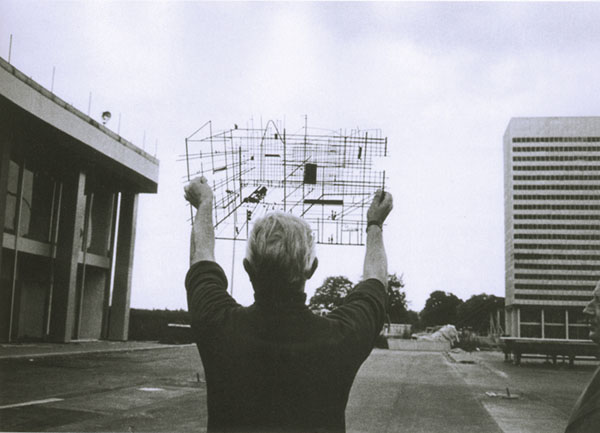You can never have enough of Jacques Tati, so let’s begin today with David Cairns, writing for Criterion: “You can consider gags as decoration—little nuggets of entertainment dispensed on the way through a story—or you can view them as architecture, structural elements that tell the story using action. Or you can see them as Jacques Tati did, which has very little to do with story at all.”
At the AV Club, Mike D’Angelo calls Criterion’s box set The Complete Jacques Tati “an invaluable one-stop tour of a singular career that spanned five decades (1934–1974) while remaining vaguely out of time.” Clayton Dillard for Slant: “Although Tati’s background as a mime and circus performer has often led to his films being characterized as meticulously composed yet whimsical gag reels meant for jollies over jouissance, there’s a palpable pain that gradually builds, particularly in the Hulot films, such that Playtime comes to embody a sort of eschatological doctrine for Western technological innovation.”
“Audrey Hepburn’s movie-career story is about an actress who was often miscast, and even more often was misappropriated by Hollywood as a symbol of something the culture at large was losing,” writes Noel Murray at the Dissolve. “But behind the scenes, Hepburn had her own ideas: about what kind of career she should have, how she should dress, and what it meant to be classy.”
The CIA not only funded the 1954 adaptation of George Orwell’s Animal Farm, it also hand-picked the British producer and film company. Martin Chilton tells the story in the Telegraph.
For the Hollywood Reporter, Clarence Tsui reviews Thomas Heise’s Städtebewohner, “a documentary about a juvenile prison in Mexico City…. Veering away from the norm of depicting Latin American correctional services facilities as gaudily-colored centers of sweltering bedlam, Heise’s slow-moving, black-and-white camera work… has transformed Mexico City’s San Fernando jail into an ethereal theater for recovering, young souls hoping for a new future.”
IN OTHER NEWS
“An advisor to the Polish President has accused the US of ‘absolute ignorance’ in seeking to arrest Roman Polanski at the opening of a Jewish history museum,” reports the BBC. Via Movie City News.
GOINGS ON
San Francisco. At the Evening Class, Frako Loden previews the 3rd i South Asian Film Festival, opening tomorrow and running through Sunday.
London. With Birth of the Method: The Revolution in American Acting on at BFI Southbank through November, Sabina Stent, writing for Little White Lies, takes a look at some of the women who championed method acting as teachers and/or actresses.
IN THE WORKS
Jamie Foxx will join Benicio del Toro in Harmony Korine’s “ensemble gangster drama” The Trap, reports Variety‘s Justin Kroll, who notes that Korine has described it as his “most ambitious film to date.” Also: “Laura Dern and Judd Apatow are joining forces for an untitled female football comedy at Universal with Pam Brady writing the script.”
“Antoine Fuqua and Jake Gyllenhaal’s first collaboration—the boxing drama Southpaw—hasn’t yet hit screens (it will arrive sometime next year), but the duo is already reteaming for a punchy new project,” reports Kate Erbland at the Dissolve. According to Ali Jaafar at Deadline, The Man Who Made It Snow is “based on the true story of Max Mermelstein, a Jewish hotel engineer who transformed Pablo Escobar’s Medellin Cartel from a small mom-and-pop drug organization into a billion-dollar enterprise.”
Cate Blanchett remembers former Australian Prime Minister Gough Whitlam, who passed away last month
David O. Russell directed and then abandoned Nailed, starring Jessica Biel, James Marsden and Jake Gyllenhaal, in 2008. Now Arrow Films has picked it up and retitled it Politics of Love and now plans to distribute it in the UK next year. Kevin Jagernauth has the full story at the Playlist.
OBIT
“Renee Asherson, the petite, husky voice actress who famously played Princess Katherine opposite Laurence Olivier’s Henry V in the 1944 cinema adaptation of Shakespeare’s play, died on Oct. 30.” Alex Ritman in the Hollywood Reporter: “Asherson’s first major film role was alongside David Niven in the 1944 WWII drama The Way Ahead, released in the U.S. as The Immortal Battalion…. Having already appeared in the stage version of The Cure for Love with Robert Donat in 1945, it was when the two reprised their roles for a film adaptation in 1949 that they would fall in love, marrying four years later. But this would only last five years, with Donat passing away in 1958…. Her last film role was in Alejandro Amenabar’s multi award-winning horror The Others in 2001 as an elderly blind medium.” Asherson was 99.
ENDNOTE
Listening (38’35”). From Karina Longworth, You Must Remember This #21: The Birth of Barbra Streisand’s A Star is Born.
More listening (103’11”). Fritz Lang biographer Patrick McGilligan is a guest in the Projection Booth, discussing The Big Heat (1953).
Among the entries to have seen the most updating lately are those on Interstellar, National Gallery, Goodbye to Language and the Viennale.
For news and tips throughout the day every day, follow @KeyframeDaily. Get Keyframe Daily in your inbox by signing in at fandor.com/daily.




